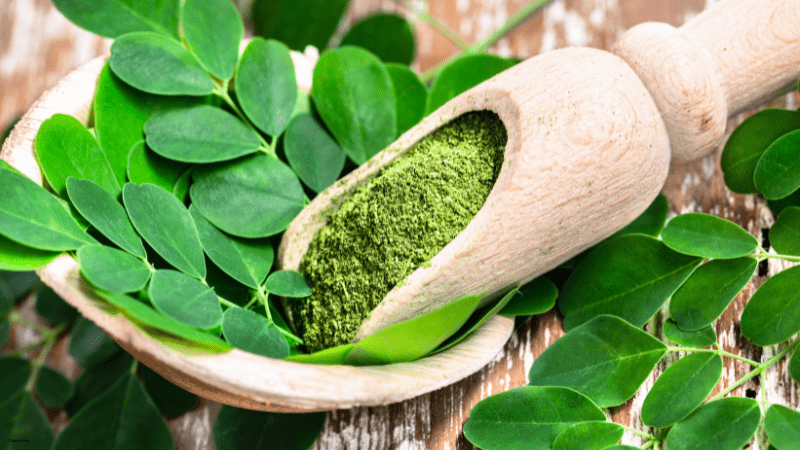Moringa: The Miracle Tree’s Potential Health Benefits
Exploring the nutritional powerhouse and potential health benefits of Moringa oleifera, from antioxidants to traditional uses and ongoing research.
A remarkable plant supplement known as Moringa oleifera, also called the “miracle tree,” is drawing widespread interest due to its extensive array of potential health benefits. This nutrient-dense plant, rich in protein and amino acids, is gaining recognition for its impressive nutrition facts and diverse moringa health benefits.
“Moringa oleifera has earned its reputation as the miracle tree because of its exceptional nutritional profile,” explained wellness expert Kelly Hopley, founder of Incorporating Wellness with Kelly Hopley, in a conversation with Newsweek. “With vitamin C content seven times higher than oranges and abundant minerals including calcium, iron, magnesium, and potassium, it’s clear why Moringa oleifera has earned such an intriguing nickname.”
Historical Use and Nutritional Profile
This ancient medicinal plant, which originates from Northern India and East Africa, has been utilized in traditional healing practices for millennia. The moringa tree contains an impressive profile of nearly 30 vitamins, over 40 antioxidants, various minerals, and additional phytonutrients. Its benefits extend beyond its nutritional content, making it a popular choice for those seeking natural health solutions.
Antioxidant Properties
The Moringa oleifera plant’s antioxidants—beneficial compounds that combat oxidative stress and cellular damage in the body—include quercetin, renowned for its anti-inflammatory properties and ability to reduce blood pressure, along with isothiocyanates, which are known to help maintain healthy blood sugar levels. These compounds contribute to the numerous moringa powder benefits and moringa leaf benefits that have been observed.

Parts of the Plant Used
“In herbal medicine, practitioners utilize multiple parts of the Moringa oleifera plant including its leaves, pods, its seeds, and bark,” nutritional expert Anna Earl from Nutrivival shared with Newsweek. “The moringa leaves are particularly nutrient-dense, offering substantial vitamins B2 and B6, vitamin C, iron, and magnesium. These are typically consumed in powdered form, often as moringa supplement capsules.”
Potential Health Benefits
While Moringa oleifera has been associated with numerous potential benefits, including its benefits for women, the scientific evidence supporting these claims remains preliminary and limited. Studies have suggested various advantages, including increased testosterone production, blood sugar regulation, reduced blood pressure and cholesterol, decreased inflammation, improved gut health, enhanced immune system function, and brain protection. Some research suggests potential benefits for anemia, rheumatoid arthritis, and edema. However, many of these studies are animal-based or lack robust scientific validation.
Challenges in Research
“The challenge with herbs like Moringa oleifera lies in obtaining conclusive scientific evidence from human trials, primarily due to funding constraints,” Earl explained. “Since moringa leaves can’t be patented, pharmaceutical and supplement companies often lack financial motivation to conduct extensive research on what moringa is good for.”
Ongoing Research
According to Katie Clare, a nutritional therapy lecturer at London’s Institute for Optimum Nutrition, “Current research is exploring the therapeutic potential of Moringa oleifera, focusing not only on its nutritional content but also its diverse phytonutrients. Studies are investigating its possible applications in preventing diabetes, cancer, cardiovascular disease, and other conditions.”
Traditional Uses
Hannah Charman, a medical herbalist at Physic Health specializing in natural menopause treatments, informed Newsweek that Moringa oleifera, commonly utilized in Asian and Ayurvedic medicine, shows promise in managing high blood pressure, blood sugar, cholesterol levels, pain relief, inflammation reduction, and ulcer treatment. “Traditional practices also recognize moringa’s ability to enhance milk production in nursing mothers,” she noted. This versatility contributes to the growing interest in the herb’s tea benefits and other forms of consumption.
Nutritional Breakdown
Research has revealed that Moringa oleifera is rich in numerous essential nutrients, including multiple B vitamins, vitamins A, C, D, and E, and vital minerals such as calcium, iron, potassium, and magnesium. It also contains tryptophan, an amino acid believed to support emotional well-being, and various antioxidants that may help reduce inflammation—a known risk factor in numerous health conditions, including diabetes and cardiovascular disease. The high protein content and amino acid profile of this herb make it a valuable supplement for those seeking to boost their nutrient intake.
Incorporating Moringa into Daily Diet
According to Hopley, moringa powder is “a very versatile supplement” that can be easily incorporated into daily meals by sprinkling it on salads or baked goods or blending it into smoothies to harness its “ancient benefits.” This ease of use has contributed to the popularity of this herb products and various supplements.
Safety Considerations
While Charman emphasized that Moringa oleifera is “generally safe,” all experts interviewed by Newsweek stressed the importance of consulting with healthcare professionals, such as medical herbalists or physicians, before incorporating it into one’s routine, particularly for those who are pregnant or taking medications. This caution applies to all forms of this herb, including moringa tea, moringa powder, and the herb’s supplements.
“For those choosing to self-administer Moringa oleifera, strictly follow the dosage instructions provided on the product label,” Charman advised.
The potential health benefits of Moringa oleifera are vast and continue to be explored. From its possible role in asthma treatment to its potential in wound healing, cancer prevention, and improving cardiovascular health, diabetes management, eye health, skin health, digestive health, liver protection, and hair health, Moringa oleifera stands out as a promising natural supplement. Its rich nutritional profile, including essential amino acids and high protein content, makes it a valuable addition to many diets. However, as with any supplement, it’s crucial to approach this herb use with informed caution and professional guidance.
Source:
Hatty Willmoth (November 18, 2024). ‘Miracle’ Supplement Praised by Nutrition Experts. Newsweek. https://search.app/CsyZFLxGT7iBqmEE6. Accessed December 5, 2024
Grow Your Own Healing Herbs: 15 Medicinal Plants for Wellness
Category
- Health Issues (72)
- Healthy Diet (48)
- Herbs for Health (11)
- Mental Health (33)
- Skin Care (20)

